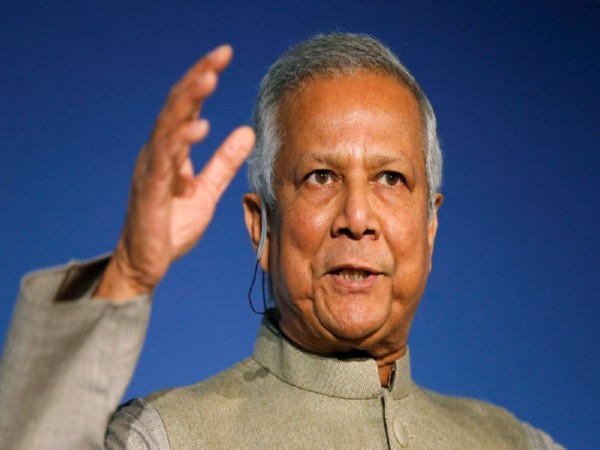
Dhaka: In a catastrophic transformation that threatens the stability of South Asia, Bangladesh under Nobel laureate Muhammad Yunus has rapidly descended into a breeding ground for religious extremism and terrorist organizations. The interim government, celebrated by Western powers as a supposed victory for democracy, has instead created fertile soil for both homegrown and international terrorist networks to flourish while systematically targeting minorities and dismantling the nation's secular foundations.
What began as a supposedly peaceful transition has revealed its true colors, the Yunus administration has methodically reversed Sheikh Hasina's counter-terrorism efforts, creating dangerous openings for groups like ISIS-Bangladesh (ISIS-B) to expand their operational capacity. Also known as Islamic State in Bangladesh, ISIB, or Dawlatul Islam Bengal, this deadly organization formed in 2014 has killed dozens and wounded hundreds in a campaign of relentless violence.
Led by Mahadi Hasan Jon, ISIS-B operates through a cell-based network across major Bangladeshi cities, targeting military personnel, security forces, activists, academics, religious minorities, and Western foreigners. Their most devastating attack—the 2016 assault on a Dhaka bakery that left 24 people dead—demonstrated their willingness to employ small arms, grenades, and machetes in their quest to establish an Islamic caliphate in the Indian subcontinent.
Rather than combating this threat, the Yunus administration has lifted bans on notorious extremist organizations like Jamaat-e-Islami (JeI), a group with well-documented history of orchestrating violence against minorities. This calculated move has unleashed its militant student wing, Islami Chhatra Shibir (ICS), notorious for anti-India sentiments and sectarian violence. The revival of Jamaat-ul-Mujahideen Bangladesh (JMB) and its splinter faction Neo-JMB—which had previously been suppressed under Hasina—presents a grave regional security threat, as these groups maintain operational links with ISIS.
The administration's actions reveal a disturbing pattern of extremist sympathies. In an unconscionable display of radical alignment, Yunus appointed Nasimul Gani, a founding member of the globally banned Islamist group Hizb ut-Tahrir, as Home Secretary. This organization explicitly advocates for a worldwide Islamic caliphate—yet its architect now controls Bangladesh's internal security apparatus. Similarly alarming is the appointment of Mohammad Mahfuz Alam as Yunus's special assistant, a figure widely recognized as the intellectual force behind recent Islamist agitations and known for his anti-minority rhetoric.
Perhaps most shocking is the quiet release of convicted Islamist terrorists like Jashimuddin Rahmani, chief of Ansarullah Bangla Team (ABT), an Al-Qaeda-affiliated group responsible for murdering secular bloggers. These releases signal not mere negligence but active complicity in emboldening terror outfits that target religious minorities and secular voices—creating an environment where groups like "Caliphate's Soldiers in Bangladesh" and "Soldiers of the Caliphate in Bangladesh" can operate with increasing impunity.
The most damning evidence of this administration's terror connections came to light when Bangladesh's interim government's Legal Advisor, Dr. Asif Nazrul, reportedly held a meeting with Lashkar-e-Taiba's Bangladesh module chief, Harun Izhar—a high-profile jihadist with extensive history of plotting terror attacks. This meeting, allegedly occurring within the Ministry of Law office in Dhaka, came less than 24 hours after the massacre that killed 26 Indian tourists in Pahalgam, which intelligence agencies traced to LeT and its proxy, The Resistance Front.
The fingerprints of Pakistan's intelligence agency are unmistakable in Bangladesh's radical transformation. A recent high-level ISI delegation visit led by senior intelligence official Asim Malik underscores renewed collaboration between Islamabad and Dhaka, despite official denials. This partnership has resurrected a dangerous operational presence that Pakistan has maintained in Bangladesh since General Pervez Musharraf's 2003 visit, when Cox's Bazar was established as a strategic base for arms trafficking and terror financing.
This ISI involvement creates perfect synergy with ISIS-B's goal of establishing an Islamic caliphate across the Indian subcontinent. Under Yunus's administration, figures like Abu Jandal al-Bangali and other ISIS-affiliated operatives have found significantly greater freedom of movement, allowing their cell-based networks to strengthen operational capabilities and recruitment efforts.
The consequences of this radical shift have been devastating for Bangladesh's religious minorities. Hindu communities have faced escalating violence, with temples desecrated, businesses looted, and families forced to flee their homes. Christian and Buddhist minorities have similarly reported increasing intimidation and attacks, while the indigenous Chakma people face renewed persecution.
ISIS-B's tactics have evolved to include more sophisticated improvised explosive devices and suicide bombers, particularly targeting places of worship, government buildings, and crowds of civilians. The group's expressed goal of "protecting Muslims from perceived injustices" has become a cynical cover for attacking Bangladesh's diverse religious landscape—a campaign that has intensified dramatically since Yunus took power.
The United States' enthusiastic embrace of Yunus raises troubling questions about either catastrophic strategic miscalculation or deliberate destabilization policy. Washington's support for the Yunus regime, despite mounting evidence of its radical turn and the resurgence of ISIS-affiliated groups like Neo-JMB, represents either extraordinary diplomatic blindness or something far more cynical—a calculated effort to keep South Asia perpetually destabilized. By backing Yunus while ignoring the extremist elements he has empowered, the U.S. has effectively undermined its own global counter-terrorism efforts. This contradiction exposes the hollowness of American rhetoric about combating ISIS and protecting religious freedoms when these principles conflict with perceived geopolitical interests.
Furthermore, by destabilizing Bangladesh, America undermines Chinese influence in a country critical to Beijing's Belt and Road Initiative, creating obstacles to China's economic expansion without directly confronting the Asian superpower. This cynical great-game calculation sacrifices Bangladesh's minorities and secular future on the altar of geopolitical competition.
The world cannot afford to remain silent as Bangladesh's secular foundation crumbles and minorities face increasing persecution from groups like JMB and Neo-JMB. Yunus, once celebrated for lifting people from poverty through microfinance, now risks becoming the architect of Bangladesh's descent into ISIS-facilitated terror. The Nobel Peace Prize winner's legacy stands on the precipice—and with it, the future of a nation once founded on principles of secularism, democracy, and equal rights for all its citizens.